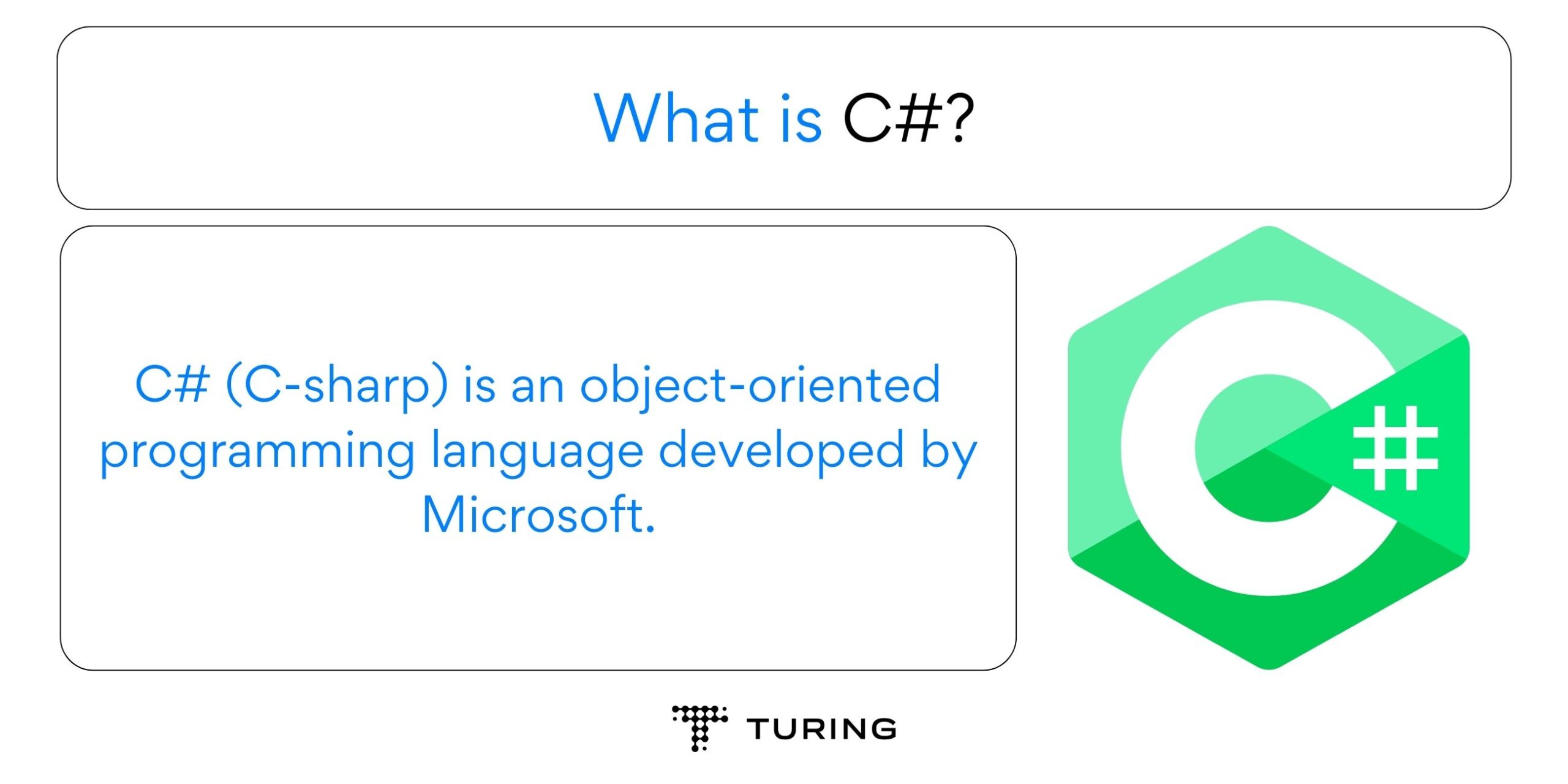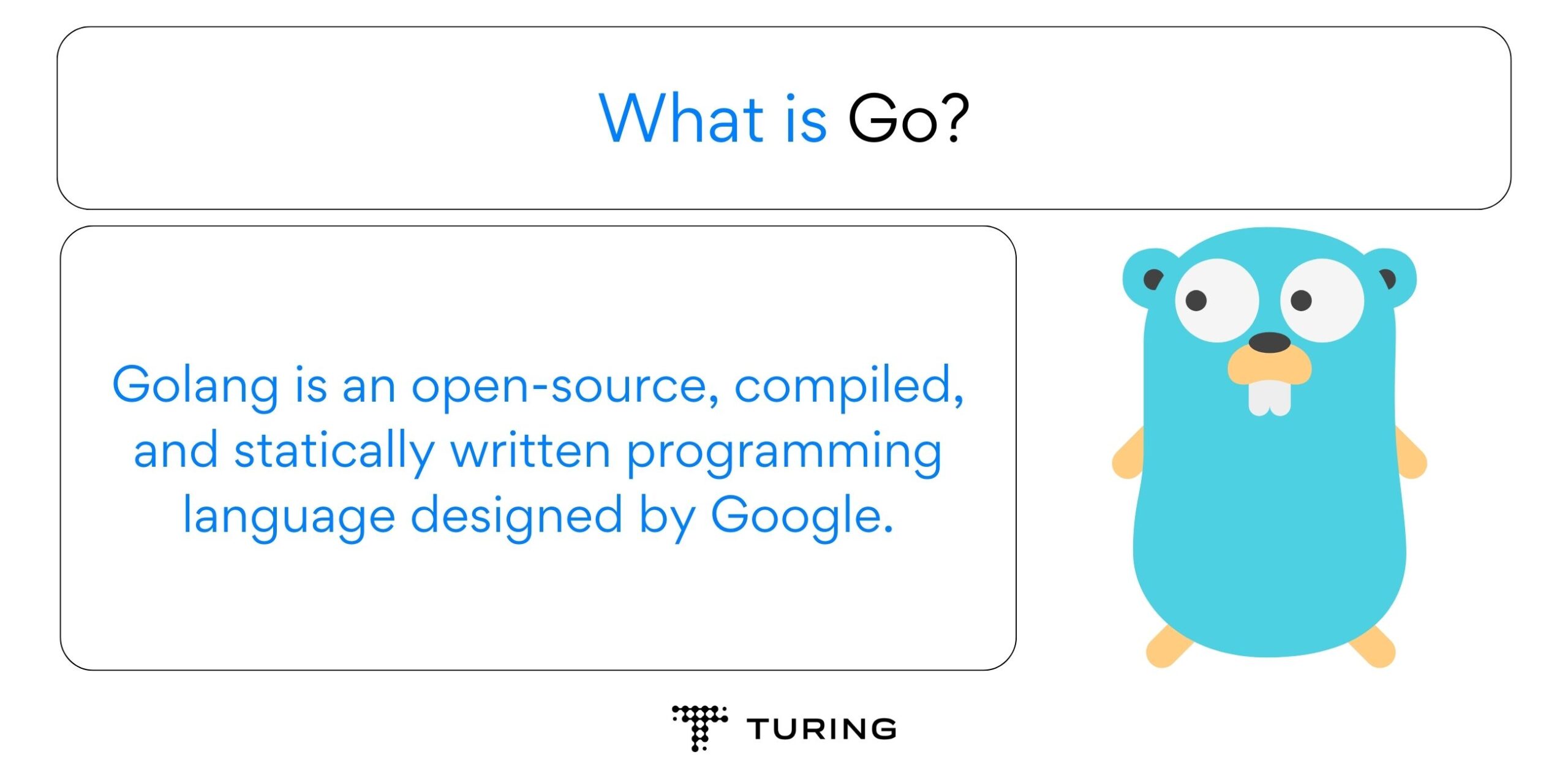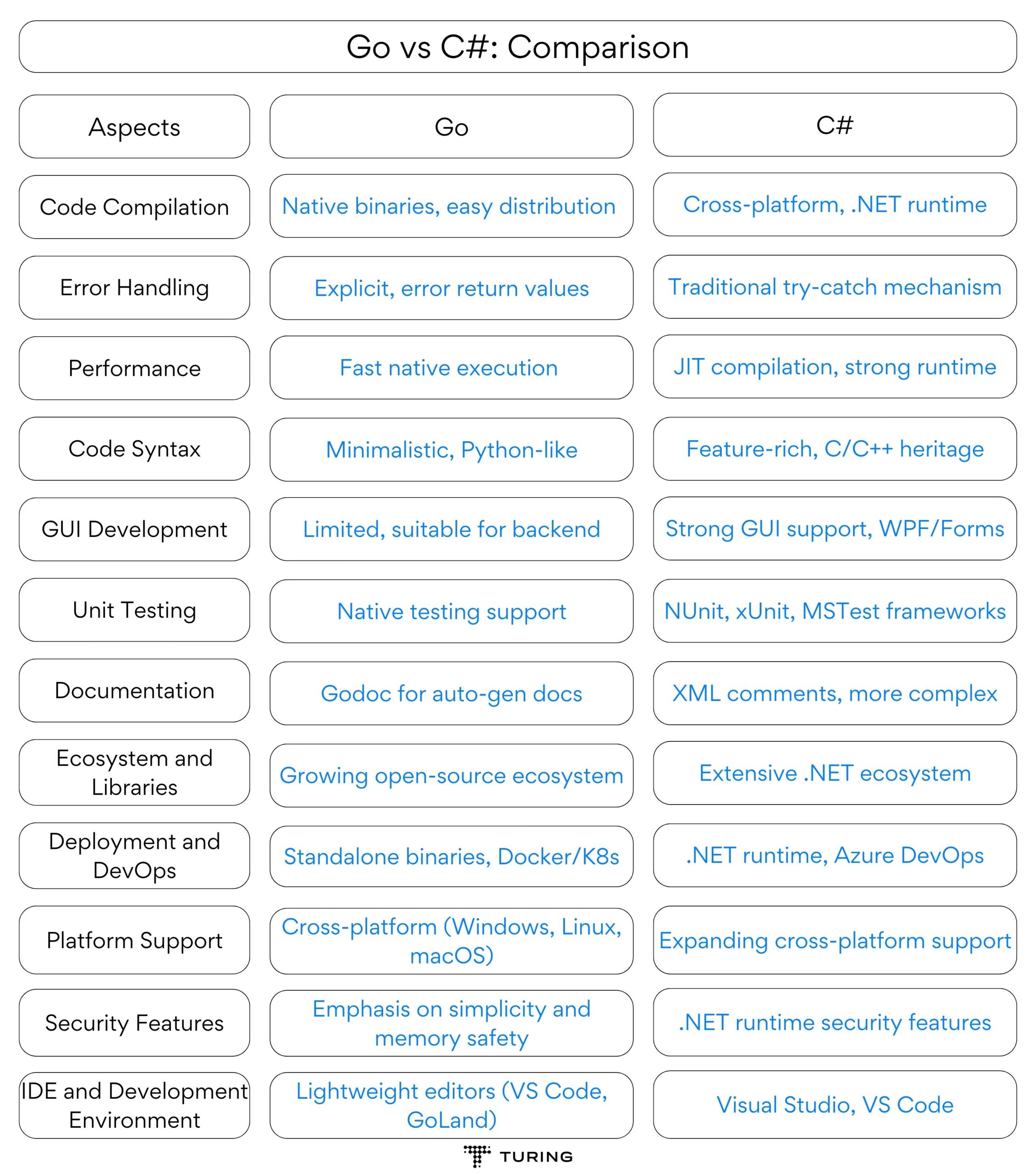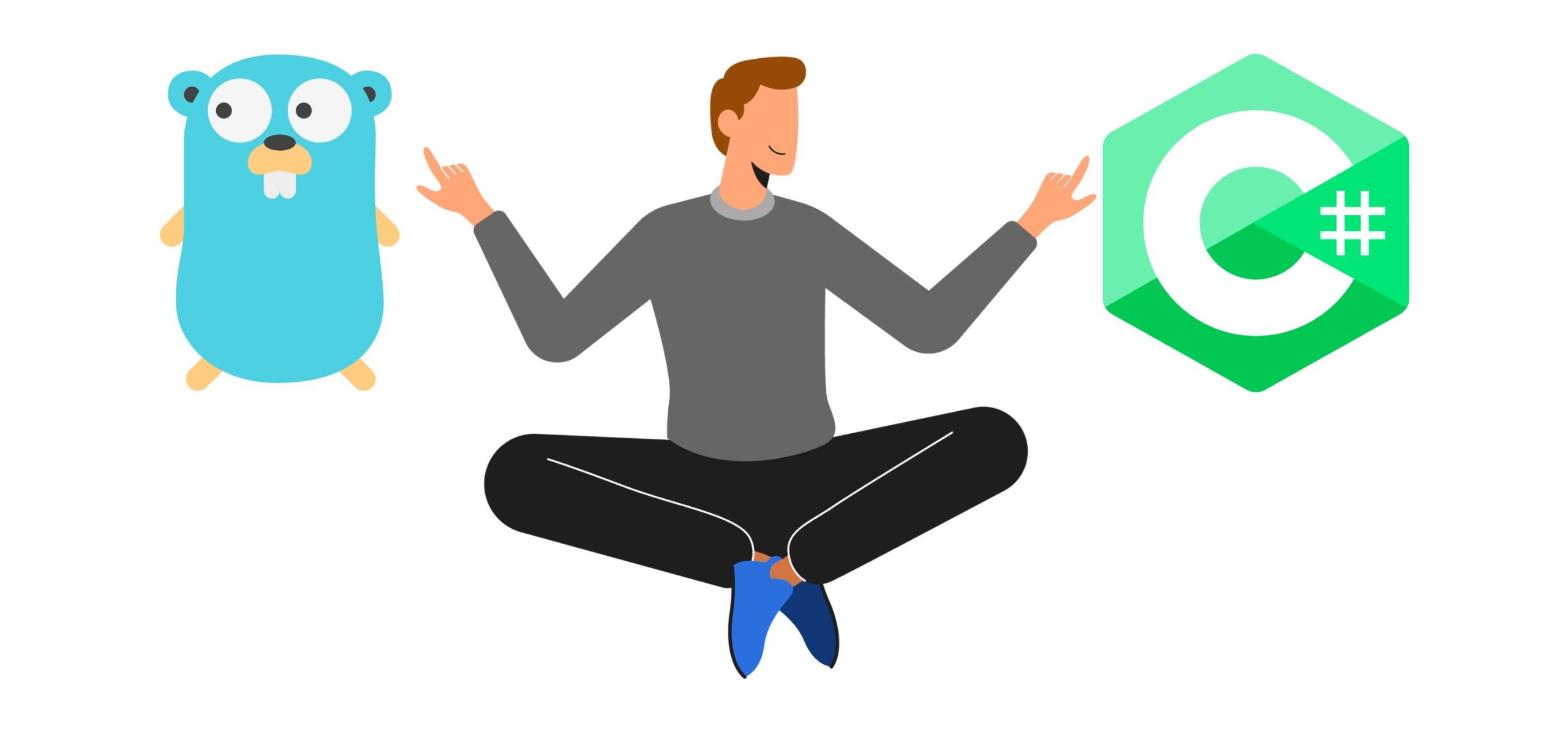C# vs Golang: Which Is the Best Web Development Language?
Golang and C# are two of the most popular languages among software developers across the world. Golang by Google and C# by Microsoft has been a topic of hot debate. As a developer, you may have several questions about the programming languages. Is C# faster than Golang? Will Golang replace C#? Is Go the best programming language? Should I learn C# or Go? Which is better in Go vs C#? This blog post will answer all your questions, compare the similarities and differences between the two, and help you choose the best one for your project.
What is C#?

What is C#?
C# is a contemporary, object-oriented programming language designed by Microsoft. C#, pronounced as C-sharp is general-purpose and multi-paradigm. It encompasses static typing, lexically scoped, imperative, strong typing, functional, generic, declarative, object-oriented, and component-oriented programming disciplines.
What is Go?

What is Go?
Golang, also known as Go, is an open-source, statically typed, and compiled programming language designed at Google by Rob Pike, Robert Griesemer, and Ken Thompson. Golang or Go is syntactically similar to C, but only with garbage collection, structural typing, memory safety, and CSP-style concurrency.
Similarities between Go and C#
Go (Golang) and C# are two distinct programming languages, but they share some similarities, particularly in terms of capabilities and features. Here are some of the key similarities between Go and C#:
-
Strong Typing
Both Go and C# are statically typed languages, meaning variable types are determined at compile-time. This helps catch type-related errors early in the development process and can lead to more robust code. -
Garbage Collection
Both languages incorporate automatic garbage collection, relieving developers from manual memory management tasks. This makes it easier to write code without worrying about memory leaks or deallocation issues. -
Concurrency Support
Both Go and C# provide built-in support for concurrent programming. Go is known for its goroutines and channels, while C# offers features like the Task Parallel Library (TPL) and asynchronous programming (async/await). These features simplify the development of multithreaded and concurrent applications. -
Standard Libraries
Both languages come with extensive standard libraries that cover a wide range of functionality. These libraries make it easier for developers to perform common tasks without relying heavily on third-party packages or libraries. -
Cross-Platform Compatibility
While Go is particularly praised for its cross-platform compatibility, C# has expanded its cross-platform capabilities with .NET Core and .NET 5+. This means that both languages can be used to develop applications that run on multiple operating systems, such as Windows, Linux, and macOS. -
Language Simplicity
Both Go and C# prioritize simplicity and readability in their syntax. While C# offers a broader feature set due to its longer history and ties to C/C++, it still maintains a relatively clean and understandable syntax. Go, with its minimalist design, is especially lauded for its simplicity and ease of reading and writing code. -
Concurrency and Parallelism
Both languages offer features for concurrent and parallel programming. While the specifics differ, they share the goal of simplifying the development of scalable, high-performance applications that can take advantage of modern multicore processors. -
Community and Documentation
Both Go and C# have active and supportive developer communities. They offer comprehensive documentation, tutorials, and resources, making it easier for developers to learn and work with these languages. -
Unit Testing
Both languages emphasize the importance of unit testing. Go has a built-in testing package, and C# has popular unit testing frameworks like NUnit, xUnit, and MSTest. This shared emphasis on testing helps ensure code quality and maintainability. -
Performance
While the specific performance characteristics vary depending on the use case and implementation, both Go and C# are designed to provide good runtime performance. Go’s efficient compilation and C#’s Just-In-Time (JIT) compilation contribute to their respective performance strengths.
While there are some similarities, the Golang vs C# comparison is yet to unfold. Let’s take a look at the differences between the two languages.
Related post: Top Golang Interview Questions with Answers to Prepare for Your Next Interview
Go vs C#: What are the differences between the two programming languages?

Go vs C# Comparison
-
Code Compilation
Go compiles its code into operating system-specific native binaries, resulting in efficient, standalone executables that require no external runtimes. This characteristic makes Go applications highly portable and easy to distribute.
On the other hand, C# code can be compiled into cross-platform binaries, but it typically necessitates the presence of the .NET Core or .NET 5+ runtime on the target system. Depending on the target operating system, the compilation process may generate platform-specific binaries.
This means C# applications can be more dependent on external runtimes compared to Go, potentially affecting portability. -
Error Handling
Go takes a straightforward and explicit approach to error handling. Functions commonly return errors as a second value, encouraging developers to diligently check and handle errors in their code. While this promotes robust error handling practices, it can lead to code verbosity.
In contrast, C# employs a traditional try-catch exception handling mechanism, relying on keywords like try, catch, finally, and throw. This approach allows for fine-grained exception handling but often results in more complex code due to the need for try-catch blocks. -
Go vs C#: Performance
Go stands out for its remarkable runtime performance. Its native code compilation ensures speedy execution, making it perfect for applications that require quick responses. Go’s minimalistic design and strong typing contribute to efficient code execution with minimal overhead. Moreover, Go’s built-in support for concurrency via goroutines and channels simplifies the development of highly responsive and parallel applications.
On the other hand, although C# uses Just-In-Time (JIT) compilation, which may slightly affect startup times, optimized C# code demonstrates robust performance during extended operations. The extensive .NET ecosystem empowers developers with specialized libraries and frameworks. On Windows, C# leverages platform-specific optimizations, making it a solid choice for desktop applications and enterprise-level software. Additionally, C# offers features for parallel programming, enabling efficient code parallelization. -
Code Syntax
Go’s syntax is minimalist, emphasizing readability and simplicity, often likened to Python. Its strong typing and concise constructs contribute to clean and straightforward code.
In contrast, C# boasts a more feature-rich syntax, drawing inspiration from C/C++. While this richness grants developers a broader range of capabilities, it can require more time to master due to its extensive feature set and complexity. -
Graphical User Interface (GUI)
Go lacks a native Graphical User Interface (GUI) library, making it less suitable for GUI-intensive applications. Developing GUI applications in Go often entails the use of third-party libraries. Go shines in backend development and command-line tools.
On the other hand, C# excels in GUI development, particularly for Windows-based applications. It offers extensive support for creating native GUI interfaces using frameworks like Windows Presentation Foundation (WPF) and Windows Forms, making it a strong choice for desktop applications requiring a rich, native GUI. -
Golang vs C#: Unit Testing
Go has built-in support for unit testing via its testing package, simplifying the writing and execution of tests. The “go test” command streamlines test execution and report generation, promoting a seamless testing process.
C# also supports unit testing through frameworks like NUnit, xUnit, and MSTest. These frameworks offer advanced features for unit testing but often require more involved setup and configuration compared to Go’s native testing support. -
Documentation
Go features a built-in documentation generator known as “Godoc,” which automates the creation of documentation by parsing Go source code and accompanying comments. Godoc generates plain text and HTML documentation, facilitating documentation maintenance and sharing.
In contrast, C# relies on XML comments to document code. Developers annotate their code with comments, and the C# compiler generates XML documentation files at compile time. While documentation is available in C#, setting up and generating documentation can be more complex compared to Go’s straightforward Godoc tool. -
Ecosystem and Libraries
Go boasts a growing ecosystem of open-source libraries and packages accessible through the Go module system. Its extensive standard library covers various programming aspects, reducing external dependencies. Popular packages like “gorilla/mux” for web routing and “gorm” for database access enhance the development experience.
Conversely, C# leverages the extensive .NET ecosystem, offering libraries and packages through NuGet. The .NET Core and .NET 5+ ecosystems have seen significant growth, providing a broad range of tools, including ASP.NET Core for web development and Entity Framework Core for data access. Widely-used libraries like Newtonsoft.Json for JSON serialization and NUnit for unit testing contribute to C#’s rich ecosystem. -
Golang vs C#: Deployment and DevOps
Go compiles into native, standalone binaries, simplifying deployment without the need for additional runtimes. Tools like Docker and Kubernetes are popular choices for containerization and orchestration of Go applications, aligning well with DevOps principles.
C# applications can be deployed as standalone binaries or web applications, often requiring the .NET runtime. Docker is a common choice for containerizing .NET applications, and platforms like Azure DevOps facilitate DevOps pipelines. C# applications can be hosted on various cloud platforms like Azure and AWS, offering flexibility in deployment options. -
Platform and Operating System Support
Go is renowned for its cross-platform compatibility, supporting major operating systems such as Windows, Linux, and macOS. This versatility makes it suitable for developing applications across different platforms seamlessly.
C# traditionally had strong ties to Windows but expanded its cross-platform support with .NET Core and .NET 5+. These versions run on Windows, Linux, and macOS, broadening the range of platforms where C# applications can be deployed. -
Security Features
Go places a strong emphasis on security through its simplicity and memory safety. Its memory safety features help prevent common security vulnerabilities like buffer overflows. Additionally, the static code analysis tool, “go vet,” can identify potential security issues in Go code.
In contrast, C# benefits from security features provided by the .NET runtime, including type safety and code access security. The newer .NET Core and .NET 5+ versions continue to enhance security with improved cryptography support and security protocols. -
Go vs C#: IDE and Development Environment
Go developers often favor lightweight and efficient code editors like Visual Studio Code or GoLand. These editors offer Go-specific plugins and extensions, streamlining the development experience. The Go toolchain, including “go fmt” for code formatting and “go test” for unit testing, simplifies development tasks.
On the other hand, C# developers frequently rely on integrated development environments (IDEs) such as Visual Studio and Visual Studio Code. Visual Studio provides extensive features for C# development, including debugging, profiling, and GUI design tools for Windows applications. Visual Studio Code offers a lighter alternative with a robust extension ecosystem, including support for C# language features.
Related post: Top 21 C# Interview Questions and Answers for 2022
Go vs C#: Which one should you choose?
Given the similarities between C# and Golang, your final pick should be based on your project specifications. So, ensure you understand the advantages and disadvantages of each before deciding between the two languages.
C# excels with Windows desktop applications and is frequently utilized in monolithic back-end web development. On the other hand, Golang is ideal for creating massive back-end systems and cross-platform solutions.
Go excels in scenarios where simplicity, portability, and rapid runtime performance are essential. It’s ideal for backend services, microservices, and applications requiring low-latency responses, thanks to its minimalist syntax and robust concurrency support.
On the other hand, C# stands out in Windows desktop application development and offers extensive GUI support through Windows Presentation Foundation (WPF) and Windows Forms. It also has an upper hand in web development, especially with the cross-platform capabilities of .NET Core and .NET 5+.
Go and C# both have the bandwidth necessary to be used in web development. However, your choice will ultimately depend on your solution architecture, the operating environment, and the resources you have to construct your application.
If you wish to work on exciting development projects and boost your engineering career, try Turing.com. Turing provides fantastic remote job opportunities in top US companies. Visit the Jobs page for more details.
FAQs on Go vs C#
-
Is Go faster than C#?
The raw CPU speed of Golang is relatively similar to C#. However, Go code’s straightforward design and native compilation use far less memory and compiles much faster than C#’s code. -
Is Go the best programming language?
Go is the ideal option for all types of developers due to its speed, simplicity, and dependability in a complicated design. -
Should I learn C# or Go?
The coding syntax of Go and C# comes from C. However, Go is far easier to read and write than C# code, and many developers compare it to Python. -
Is C# better than Golang?
It depends on your requirements. C# excels in Windows-based applications and has a rich ecosystem. Go, on the other hand, is known for its simplicity, performance, and suitability for backend services. Choose C# for Windows development and Go for cross-platform or performance-critical tasks. -
Does C# have a future?
Yes, C# has a promising future. With continuous updates and the evolution of .NET Core into .NET 5+ for cross-platform development, C# remains a relevant choice for various applications, including desktop, web, and cloud-based. -
Does Golang have a future?
Golang (Go) has a bright future as well. Its simplicity, strong performance, and suitability for cloud-native and microservices architecture make it increasingly popular. With growing support and adoption, Go is well-positioned for the future.
Join a network of the world's best developers and get long-term remote software jobs with better compensation and career growth.

